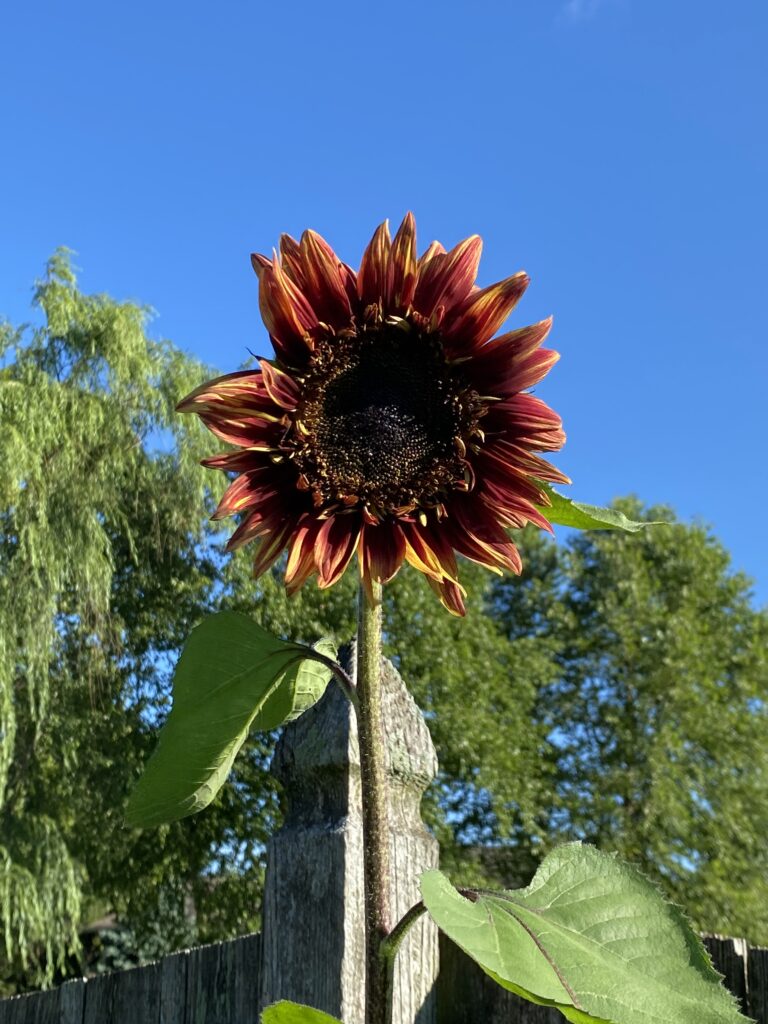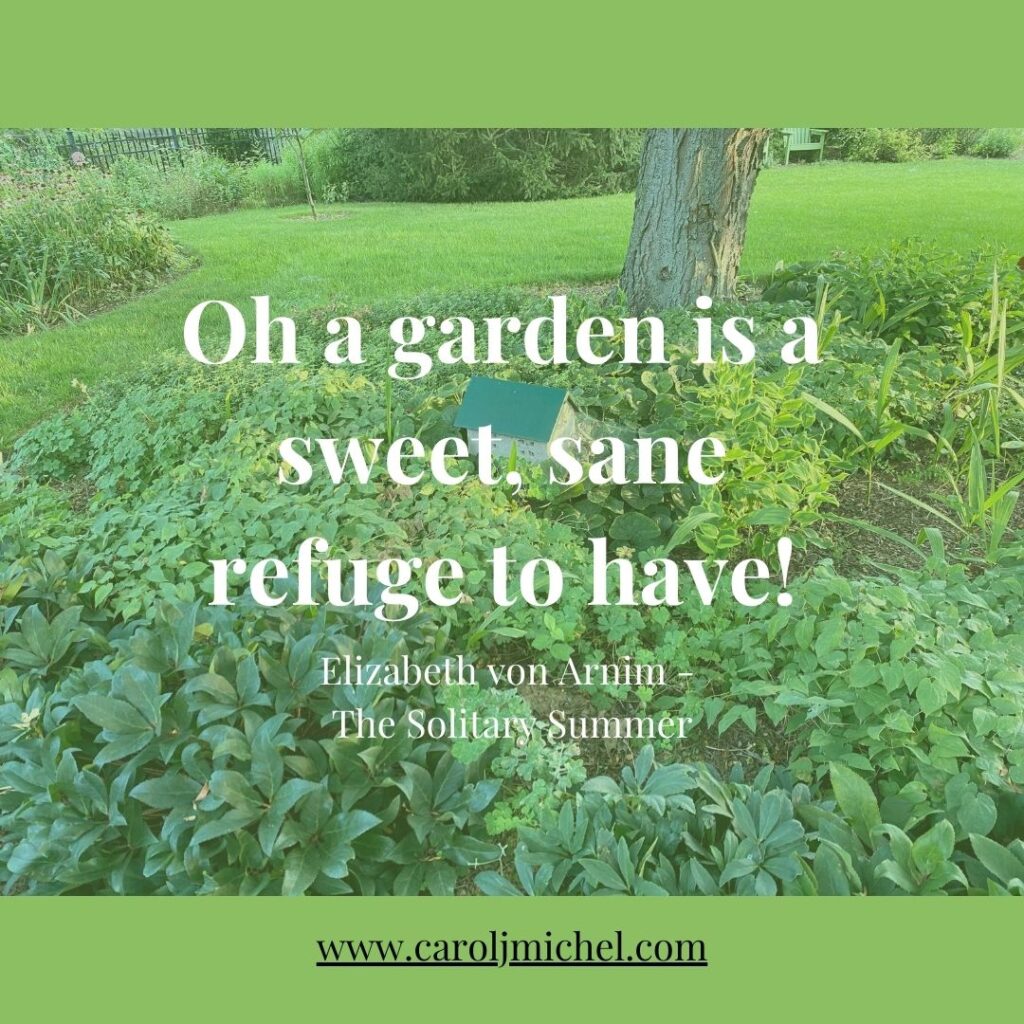
I was scrolling through my Kindle, looking for the next book to read, and up popped The Solitary Summer by Elizabeth von Arnim (1899).
You remember Elizabeth, don’t you? She’s mostly known for Elizabeth and Her German Garden (1898). This follow up novel is almost a novelette—you could read it in an afternoon, and I did.
The premise of the story is stated right up front.
“I want to be alone for a whole summer, and get to the very dregs of life. I want to be as idle as I can, so that my soul may have time to grow. Nobody shall be invited to stay with me, and if any one calls they will be told that I am out, or away, or sick. I shall spend the months in the garden, and on the plain, and in the forests. I shall watch the things that happen in my garden, and see where I made mistakes.”
Of course, the woman who is telling the story is not really alone for the summer. She goes for outings with her three children, April, May, and June. Her husband whom she calls “Man of Wrath” is in and out. And at one point she leaves her estate and heads down to the village to check on the residents of the cottages there, and later military officers take up residence with them for a short time and she has to endure a few meals with them. Plus, in her garden there is a new head gardener and several under-gardeners, but she believes they have been instructed to leave her alone and stay out of sight.
But other than that, she tries to have a solitary summer in her garden.
I highlighted several passages.
On Books
“Books have idiosyncrasies as well as people, and will not show me their full beauties unless the place and time which they are read suits them.” I agree! I think this book is a great summer afternoon read. I’m not sure what might happen if I tried to read it on a wintry day.
“What a blessing it is to love books. Everybody must love something, and I know of no objects of love that give such substantial and unfailing returns as books and a garden.” That would look nice framed and hung by a bookshelf.
On Gardening
“It is delightful and instructive to potter among one’s plants, but it is imperative for body and soul that the pottering should cease for a few months, and that we should realize the grim other side of life. A long winter lived through from beginning to end without shirking is one of the most salutary experiences in the world.” I do think winter is good for a gardener and makes us appreciate those perfect summer days when you can just step outside and into the garden without thinking about what coat to wear.
“My idea of a garden is that it should be beautiful from end to end, and not start off in front of the house with fireworks, going off at its farthest limit into sheer sticks.” Doesn’t that give you a pause to reflect on your own garden? Many people in my neighborhood plant shrubs in front of their house, but leave the sides blank. Of course, you could argue that they aren’t really trying to have a garden…
“It makes one so healthy to live in a garden, so healthy in mind as well as body.” I’m assuming if you are reading this, you are a gardener and you agree! She also was lamenting that the women in the village kept their sick children shut up in the cottages, and she thought they should take them outside for fresh air.
“Nature herself is untidy and in a garden she ought to come first, and Art with her brooms and clipping-shears follow humbly behind.” I think more gardeners are following this advice these days, letting plants grow to their natural shape instead of pruning them into little balls.
On Speaking and Praying
“… further, experience has taught me that whenever anything is on the tip of my tongue the best thing to do is to keep it there.” I like that. It reminds me that not everything has to be said out loud!
“Nature is so clear in her teaching that he who has lived with her for any time can be in little doubt as to the “better way.” Keep quiet and say one’s prayers—certainly not merely the best, but the only things to do if one would be truly happy; but ashamed of asking when I have received so much, the only form of prayer I would use would be a form of thanksgiving.” – I had to read that a few times, but then I understood it and it made sense. Be thankful!
Final Thoughts
I enjoyed this book, more than I thought I would, and it was nice to spend an afternoon with it.
Elizabeth von Armin wrote 20 books. I actually started to read another one called Christopher and Columbus about twin sisters who were shipped off from England to America by their aunt and uncle after their mother dies. I got about a quarter way through it and set it aside. I guess this summer wasn’t the place and time for it, but one day it may be.
But it was the time and place to read The Solitary Summer.
Here’s one final quote to ponder!

(Reprints of Elizabeth von Arnim’s books are easy to find and many of her books are available to download to the Kindle reader for free. There are even audiobooks available for some titles. Last year, in April I think, I listened to another one of her books, This Enchanted April (1922), which I also enjoyed, at least as an audiobook.)


Thanks for introducing us to this author. A kindle book of 11 of her collected works is available for $0! This will be lovely to portion out over the months ahead. What a nice find.
Yes, it’s nice that her books are in the public domain now and can be read for nothing!
I’ll have to check out her work. It sounds wonderful. I’ve recently discovered a woman who was poet laureate of Maryland in the 1800s. She wrote lovely nature poetry! I think you would like her. Her name was Lisette Woodworth Reese. I’m reading two of her books now.
I will look her up!